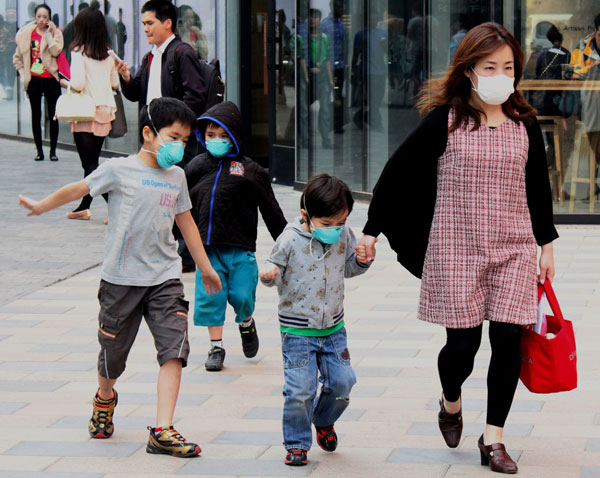Beijing aims to clean up air during APEC meeting
 0 Comment(s)
0 Comment(s) Print
Print E-mail China Daily, April 10, 2014
E-mail China Daily, April 10, 2014
Beijing is considering stricter traffic controls and suspension of polluting enterprises during meetings at the Asia-Pacific Economic Cooperation that are scheduled to take place later this year in the city's Huairou district.
|
A mother with her three boys wearing respirators in Sanlitun village, Chao Yang district, Beijing, April 8. [Photo/China Daily] |
To prevent the smog from enshrouding the capital during the APEC event, the city vowed to reprise measures taken during the 2008 Beijing Olympics, including traffic control to cut emissions based on vehicles' license plate numbers, suspension of certain industrial operations around the city's suburbs and halting work at construction sites.
Zhuang Zhidong, deputy head of the Beijing Environmental Protection Bureau, said the capital will undertake the measures together with neighboring cities and provinces.
Officials in the Beijing-Tianjin-Hebei hub will jointly come up with an air quality warning platform to share information about pollutant intensity, Zhuang said, while carrying out regional inspections and supervision of polluting workshops, illegal outdoor barbecues and coal-fired boilers.
Zhuang also appealed to Beijing's neighboring provinces to adopt the latest standard for fuels - the National V standard - that calls for sulfur content of no more than 10 parts per million.
Beijing has adopted the National V standard for gasoline and diesel fuels, which is expected to be implemented nationwide by the end of 2017, according to the timetable for national fuel quality upgrades.
The poor fuel quality from neighboring provinces has also contributed to the capital's smoggy days, according to the bureau.






